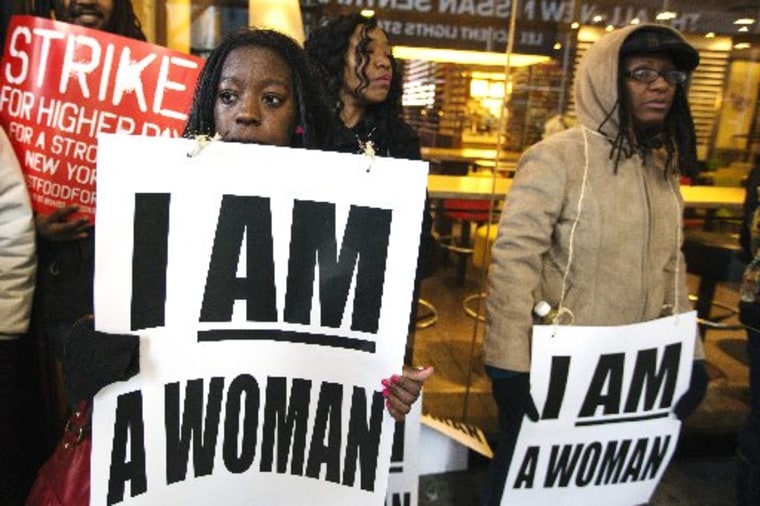Thursday morning, hundreds of fast food workers in New York City walked off the job in what could be the largest strike in the fast food industry's history. This is the second major labor action in a long-term campaign by fast food employees, the community organizing group New York Communities for Change, and community allies. The first day-long strike came in late November 2012, when the organizing workers first announced themselves to the world and demanded higher wages and union recognition.
The date of this second strike is not a coincidence: April 4 is also the anniversary of Martin Luther King Jr.'s assassination. When King was shot and killed in 1968, he was visiting Memphis, Tenn., to rally on behalf of striking sanitation workers. The 1968 Memphis sanitation workers strike, the last major campaign of King's life, came at a pivotal moment for both workplace rights and racial justice. Now, New York fast food workers are consciously borrowing that strike's rhetoric and tactics, and framing their struggle as a direct continuation of the great civil rights leader's final battle.
Fast food workers and Memphis sanitation workers have had "similar struggles," said Chad Tall, a strike leader and Taco Bell employee. "The thing that set [the sanitation workers] apart from everyone else is they made a decision to change it."
Tall is part of a group of fast food workers who met with two surviving members of the 1968 strike in late March. "That's what they told us," he said. "Make the decision, then do it."
Fast food workers are in a similar position to sanitation workers in 1968, said labor and civil rights historian Michael K. Honey, author of a book about the Memphis sanitation strike.
"In the case of sanitation workers, 40% of them were actually getting welfare benefits while they were working full-time jobs because they were so poorly paid," he told msnbc. Today, the fast food industry provides an annual mean wage of $18,600, lower than any other industry in the United States.
"To live in New York City, $15 an hour will get you by if you work full-time, and we're getting less than that," said Tall. "[Sanitation workers] had a home, but that's pretty much all they had: housing and food."
Though the fast food strike does not take place in a post-Jim Crow South, it does also reflect the racial stratification of a major American industry. Whereas the striking sanitation workers were African-Americans struggling against racial discrimination, modern people of color are disproportionately employed in low-wage service jobs, such as fast food service.
The 1968 strike, said Honey, "wasn't just about the right to join a union. It was about human dignity, and particularly black civil rights and black freedom." The fast food strike has adopted some of that language of freedom and dignity, even borrowing the iconic slogan seen on many 1968 Memphis workers' picket signs: "I AM A MAN."
Fast food strike organizers have also worked to form partnerships with leaders outside of the labor movement, such as members of the clergy and city council members.
Similarly, said Honey, Memphis workers won their strike "through tremendous national support and local mobilization. It was a huge movement in Memphis. They had most of the black churches, some of the white churches, most of the organized labor movement on their side." While union representation for fast food workers looks like a long shot, "workers in Memphis in 1968 wouldn't have thought they had any hope at all of successfully organizing a union."
Thursday's strike is unlikely to be the last of the fast food workers' labor actions. But speaking to msnbc on the morning of the strike, Tall said there was "a ton of positivity coming from people." If recent history is any indication, Thursday's events could cause the campaign to grow even larger.
Still, there are significant hurdles to overcome. For one thing, said Honey, "fast food workers are operating in a climate which is, in some ways, pre-1968 with regards to worker rights." As union density has declined and many of the legal institutions which promoted labor organizing have been dismantled, winning recognition has become even more of an uphill climb.
"1968 was kind of a turning point," said Honey. "We lost Dr. King, we lost Robert Kennedy, but unions in the public sector expanded dramatically despite all of that. And we're at a turning point again, where they're really trying to dismantle the labor movement completely. It's really a historic moment for unions, so it's very important for fast food workers, hotel workers—service economy people—to be able to get unions and have some power at work."
